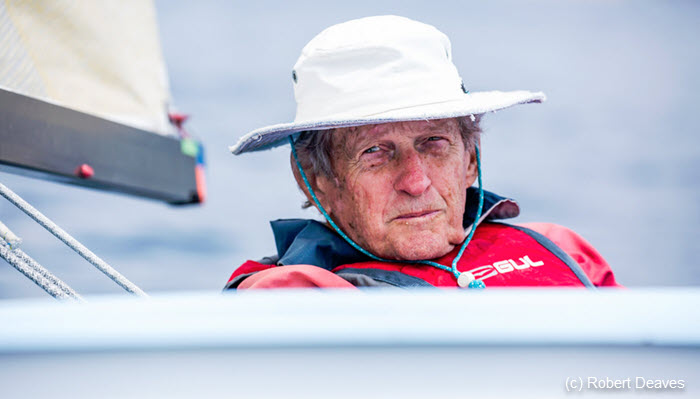Guest Editorial: On the Olympic ideals for which the Finn was designed and built
- AUGUST B. MILLER
- May 27, 2018
- 5 min read

["Finn Masters Travel Notes" was the subject of an email, authored by the sailing legend and our longtime friend Gus Miller (USA), that was circulated to a number of his friends this morning. Gus wrote this following the Finn World Masters Championship that took place this past week in El Balís, Spain (near Barcelona) with an amazing 350 entries. With the permission of Gus we reprise it here as what your Ed. believes is a timely and important Guest Editorial. Photos are courtesy of Robert Deaves/Finn Class and Gus Miller. –TFE]
EL BALíS, SPAIN (#1023) – Throughout this journey and for the last 18 months there has been a tension between the ideals inherent to the Finn and an institutional corporate strategy by World Sailing of global marketing for potential profit. A tension between the ideals of the event for which the Finn was designed and built, and a perceived large return on commercial opportunities in a rapidly changing world.
While I immersed myself in the treasured culture of the Finn Class here in El Balís, there was an undercurrent of these tensions.
The "Learning a Finn Dinghy" author and accomplished ocean seaman John Alexander accurately explained to me at one breakfast together. He said:
The more money that comes into a sport, the less the participation. The money goes into the top of the pyramid while the base withers from elitism and reality TV. A sporting body does not need to be big and complex. The danger is it will become a machine that needs to feed itself. Now self-serving it then sees media as an income stream more important than the athlete and sport it is supposed to serve. It has then lost track of who its customer is. When the GBR had its recession, it pushed into sport to improve life. The lottery was instrumental but not being from the "right school" limited access. Professional sport is different from life as you want a guaranteed return like being a doctor or lawyer; you then lose focus to become self-serving and not serve the athlete. When there is money and conflicts of interest, it brings to mind the old saying, ‘A fish stinks from the head.’
Another World Champion and Olympian told me:
It was very sad. I came back from Athens [2004 Olympics] realizing that it was all about money and not about human potential and athletic competition.
This is my synopsis of what other Olympians and Finn veterans told me after the World Sailing Mid-Year meetings in London:
There was so much nonsense about the Finn being out of the Olympics. We were really concerned by rumors about our class and the future of our lives. There was not good communication. The World Sailing meeting reflected unclear leadership, unclear long range plans. No one had a clue about what happens in the boat park; World Sailing was uninformed. There were clear differences in how sailors and the WS administration see objectives – the top is more unclear.
We got disappointment out of London; now there is no hope – hope disappeared when we saw who is leading the body and where they are going. Most have conflicts of interest and are very subjective. You can tell when people are trying to impose their own view – if you do not agree, then you are the enemy. Sailing is being harmed by the lack of open discussion. Money is the top interest – how to get money. The key is to remind people that Olympic Sailing is an amateur sport. World Sailing needs to have ideas that look at the big picture, not just the financial picture. World Sailing is lacking the big picture. They lack the capability of being good leaders; they are not capable of taking the sport to the next level.
Change is necessary in every part of life, economics, politics, sport. What is important is the way change is made.
Change without purpose is destructive. As amateur athletes we have dedicated years of our lives to preparation yet what is proposed would destroy many lives, destroy opportunity. The Finn is a clear example of integrity in sport so the way changes are made is of concern. If the Finn is replaced, for example, by a keel boat costing $250,000 it will exclude too many and in the light air of the Med during the games it will be a boring non-contest. How many people can afford a keel boat?
There are more important values than money and sport offers them. We were looking for those values at the meeting but realized while there it was quite the opposite. We heard people compare sailing with skiing and other sports where weight makes no difference. We were told that if a Finn sailor could not lose weight to that of a “normal person” they should not sail but go play basketball. How can a guy who weighs 100 kg and has 10% body fat drop to 80 kg?
Another point is that the Finn can race and thrive in a broad range of conditions, including when no other Olympic boat can survive.
Don’t take the classic boats out of the Olympics. To do so would lose important traditions, it would take the heroes out of sport. It would lose something pure – choosing the hard path regardless of money as most people are not capable of taking the difficult path for personal growth and that is why reality TV is a pretense. Tradition transmits excellence to society, how to achieve without losing basic human values. In the world today, most anything can be bought but there are two things that can not be bought: knowledge and true sport success.
On a personal note, the young 40+ year olds in El Balís still had muscle rippling their backs while most of those older have smooth backs and bulges of fat in unattractive places. But after six months of preparation, I now look more made of bridge cable and receive compliments on my level of fitness. One friend asked, “Gus, do you ever have a time out to just relax? You are always high energy and driving.” Well, I worked hard and with discipline to build strength and endurance, and that is what friends are observing. Perhaps one of the best memories of El Balis is what one new young friend wrote, “Congratulations Mr. Super Legend, pleasure to meet you and to listen to your thoughts. Keep being that small statistic of fantastic because we all believe in you.”
Just as I believe in the fantastic ideals of the event – the Olympics – for which the Finn was designed and built.

Sailing legend Gus Miller (USA, right) with former longtime Finn Class President Gerardo Seeliger (ESP). Both raced in last week's Finn World Masters Championship with 350 entries. At age 83, Mr Miller was the oldest competitor, and is the author of the guest editorial, above. Photo: Robert Deaves / Finn Class.
Interview with Gus Miller in El Balís, ESP last week. Video, from YouTube, courtesy of the Finn Class.

José Luis Doreste (ESP, age 61), the Finn Class Olympic gold medalist at Pusan, KOR in 1988, was the overall winner in El Balís last week having not raced the Finn in 30 years. Photo: Robert Deaves/Finn Class.









































Comments